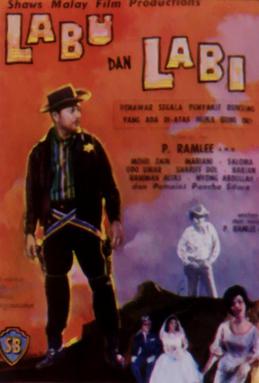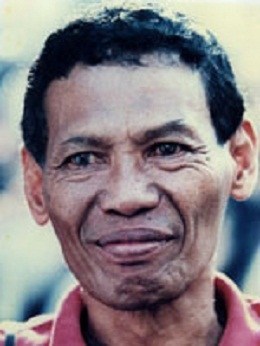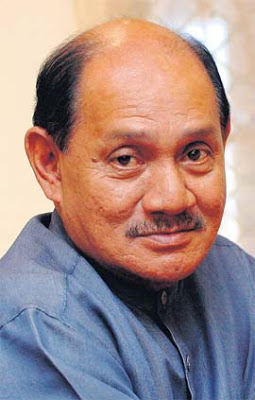Jalan Ampas is a street near Balestier Road in Singapore where the movie studios Malay Film Productions and its affiliate Shaw Brothers were located.

Tiga Abdul is a 1964 Malaysian Malay-language black-and-white comedy film directed by and starring Malaysian silver-screen icon P. Ramlee. It tells the story of three brothers who are caught in a web of trickery set by the cunning Sadiq Segaraga, who uses his three daughters to try and fleece the three brothers of all their wealth. The movie is a tribute to traditional folktales with a moral set into the story and is set in a fictional Middle Eastern country named Isketambola, loosely based on Istanbul, Turkey. It was the last film to be directed by P. Ramlee in Singapore before he moved to his new workplace in Merdeka Studios, Kuala Lumpur in 1965.

Labu dan Labi is a 1962 Singaporean Malay-language black-and-white buddy comedy film directed by and starring P. Ramlee. The movie was filmed in Singapore and it revolves around the antics of Labu and Labi, two servants with wild imaginations who work in the house of a wealthy but miserly man, Haji Bakhil bin Haji Kedekut. The movie is filmed in the style of a stage pantomime, with over-the-top comedy and featuring the characters occasionally breaking the fourth wall. The film's sequel is Nasib Si Labu Labi.

Ali Baba Bujang Lapok is a 1961 Singaporean Malay-language black-and-white comedy film directed by, written by and starring Malaysian silver-screen legend P. Ramlee and produced in Singapore by Malay Film Productions Ltd. Based loosely on the story of Ali Baba from 1001 Arabian Nights, the film is occasionally self-referential and contains elements of anarchic comedy, burlesque comedy, satire and farce. The title includes the suffix Bujang Lapok because it is the third instalment in the Bujang Lapok series of comedy films that star the trio of P. Ramlee, S. Shamsuddin and Aziz Sattar. This film marked the feature film debut of Sarimah, who would go on to a long movie career, and is also notable as one of the few P. Ramlee films where he plays the villain.
Nasib Si Labu Labi, or known as What Happened to Labu and Labi is a 1963 Singaporean Malay-language black-and-white buddy comedy film directed by and starring P. Ramlee. The film is a sequel to Labu dan Labi and features a number of returning cast members.
Pendekar Bujang Lapok is a 1959 Singaporean Malay-language black-and-white comedy film directed by P. Ramlee. It is the second in the Bujang Lapok series of films, and stars the trio of P. Ramlee, S. Shamsuddin and Aziz Sattar, all of which was filmed on site at Jalan Ampas, Singapore.
Antara Dua Darjat (English: Between Two Classes) is a 1960 Singaporean Malay-language black-and-white romantic melodrama film directed by and starring Malaysian silver-screen legend P. Ramlee and Saadiah. This film revolves around the obstacle of romance for a couple of lovers due to family holdings that adhere to the ladder of rank and descent which cannot unite those of high rank and low rank thus triggering bloody conflict, mental stress, family feuds up to hypocracy and soul murder.

Nujum Pak Belalang is a 1959 Singaporean Malay-language black-and-white comedy film directed by and starring P. Ramlee. The film is styled as a fairytale and is loosely based on a Malay folk tale.

Datuk Abdul Aziz bin Sattar was a Malaysian actor, singer, comedian, and director who is mostly known for his roles in the black and white Malay films of the 1950s and 1960s.
Budak Lapok is a 2007 Malaysian animated film. Based on the P. Ramlee film Bujang Lapok, the film premiered on 13 October 2007 and was directed by Anwardi Jamil. It became the first Malaysian animated movie released in six years since Putih in 2001.

Salmah binti Ismail, better known by her stage name Saloma, was a Singaporean-Malaysian singer, film actress, trendsetter and a fashion icon who became well known in the late 1950s.

The Jalan Ampang Muslim Cemetery is a cemetery at the Kuala Lumpur city centre, Malaysia. It is located at Jalan Ampang near Kuala Lumpur City Centre. The cemetery was established on 1819.
Bujang Lapok is a 1957 Singaporean Malay-language black-and-white comedy film directed and performed by P. Ramlee. This is the first installment of the Bujang Lapok series of films.

Shamsuddin bin Dali, known professionally as S. Shamsuddin, was a Singaporean actor and comedian who appeared in Malayan films during the 1950s and 1960s.
Bujang Lapok Kembali Daa, or The Return of the Three Bachelors is a 1985 Malaysia Malay-language comedy film directed, written and acted in by Aziz Sattar. In this film, P. Ramlee's son, Nasir P. Ramlee (1953–2008) took over his late father's place in the trio. This would be the fifth and last installment of Bujang Lapok film series.

Nasir P. Ramlee was a Malaysian actor, composer, musician and singer.

Sarjan Hassan is 1958 Singaporean Malay-language black-and-white war drama film starring P. Ramlee. The film is set during the Japanese invasion of Malaya during the Second World War. Initially, the film was supposed to be directed by Lamberto Avellana; however, he was unable to fully complete the film. The directing task was later taken over by P. Ramlee.
Anak-ku Sazali is a 1956 Singaporean Malay-language black-and-white melodrama film directed and written by Phani Majumdar. The movie is about love between a man and a woman, dreams that can come true and a father's extreme love for his son. The talented P. Ramlee plays the adult father character, Hassan as well as the spoilt son, Sazali Hassan.
The Bujang Lapok film series consists of five comedy films:
- Bujang Lapok (1957)
- Pendekar Bujang Lapok (1959)
- Ali Baba Bujang Lapok (1960)
- Seniman Bujang Lapok (1961)
- Bujang Lapok Kembali Daa (1985)
Do Re Mi is a 1966 Malaysian Malay-language black-and-white satirical comedy film directed by and starring P. Ramlee. The concept was partly based on the idea of The Three Stooges with Ramlee playing the character Do. Its success led to two sequels, Nasib Do Re Mi and Laksamana Do Re Mi (1972), Ramlee's last film before his death.










